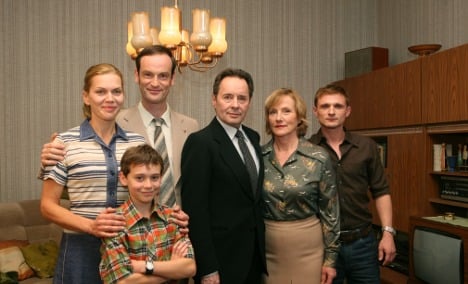As Germany prepares on Sunday to mark the day East and West Germany merged into one nation after four decades of division, the programme “Weissensee” on ARD public television has become a runaway hit.
A kind of East German “Romeo and Juliet,” the show is serving as a powerful – if melodramatic – reminder of the awful choices faced by citizens of a repressive state and the courageous ways they manage to carve their own paths.
Drawing around five million viewers or about 16 percent of the television audience each week, the show was launched this month for a six-week run but its producers have already won an extension.
“Weissensee,” named after a district of East Berlin, has drawn comparisons in the press to “Dallas,” the smash 1980s US family saga set in oil-rich Texas, with its breathless portrayal of good guys and bad guys, high drama and low comedy, an alcoholic mother and even a love-struck American.
At the heart of the action are two families: the Kupfers and the Hausmanns, living in the year 1980, nine long years before the Berlin Wall fell.
The former is an ambitious clan of Stasi secret police officers and their enablers, some of whom begin bearing the psychological scars of their duplicitous work.
Meanwhile the matriarch of the second family, Dunja Hausmann, is a bohemian dissident cabaret singer, an enemy of the state who is linked to the Kupfers by an illicit love affair.
The two clans become further entangled when the prodigal son of the Kupfers, who has opted to remain a humble cop on the beat instead of pursuing his family calling, falls in love with Hausmann’s beautiful daughter Julia.
Julia has been dating Robert, a flashy half-German with a US passport whom she sees as her ticket out of the country. But she abandons her plans of escaping the East when she meets the charming, big-hearted Martin Kupfer.
The two families try to little avail to keep the lovers apart, with the Kupfers deploying the nefarious machinery of the Stalinist state.
The Kupfers enjoy all the privileges of the Stasi network including a plush villa with a garden and three Trabant cars. They see Julia Hausmann as a threat to their future in the apparatus.
They prevent the couple from gaining official approval to rent an apartment together, and Martin’s conniving brother even tries to use his young daughter as a weapon against him.
“Weissensee” has won critical praise for authenticity, from the suffocating atmosphere of suspicion and treachery to the pitch-perfect Orwellian language of the Stasi officers and the scarcity of consumer goods.
“It is balanced and without a doubt quality television,” wrote the daily Thüringer Allgemeine in east Germany.
“Twenty years after German unity, the series is finally here that grants some ‘Ossis’ their dignity,” wrote weekly Die Zeit, referring to east Germans.
It noted it was the first series to show “the other Germany” entirely from the inside, with a sympathetic look at the joys and struggles of its citizens.
Many of the actors taking part grew up in the German Democratic Republic, as the communist rulers called their state, and suffered repression.
Katrin Sass, who played the mother in the international hit “Goodbye, Lenin!”, appears as Dunja Hausmann. In real life, she was spied on and betrayed by several people close to her including her purported best friend.
Another actress in the series spent time in a Stasi jail while a co-star fled for the West at the age of 17.
“It is a kind of credibility guarantee,” daily Hamburger Abendblatt said of the actors’ real-life experiences.
AFP/ka


 Please whitelist us to continue reading.
Please whitelist us to continue reading.
Member comments